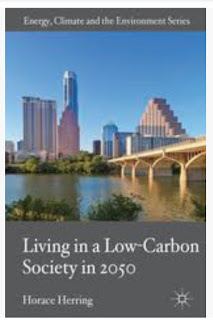
Editor Horace Herring is a UK researcher who has been contributing to the scientific world through the study of energy efficiency to mitigate climate change in articles and research dating back to an alternative energy directory published in 1978. Herring was one of the first environmental writers to add extensive modelling and data challenging the early idea that energy efficiency measures will somehow reduce consumer patterns of increasing energy consumption. His articles and books include extensive consumer surveys on the adoption of low to zero-carbon energy technologies and the workability of domestic energy efficiency measures. His 2005 book "From Energy Dreams to Nuclear Nightmares: Lessons from the Anti-nuclear Power Movement in the 1970s" does not discard nuclear power as a technology but believes there are complex social reasons why public opposition to nuclear power generation is so prevalent. This 2012 book edited by Herring is a series of essays broken into policy, case studies and stories. The book opens with the comment that there are millions of people already low-carbon lifestyle i.e. the world's poor, and that they would love to join the carbon-intensive society, making the need for solutions all the more dire. the policy section is represented by the essay work of Stephen Peake, who is a lecturer in Environment for the Faculty of Science, Technology, Engineering and Mathematics, at The Open University. The other policy writer in this section is Nicola Hole (Geography, University of Exeter). Together they create an interesting section that addresses the weakness in policy that targets behaviour change. While this has an important element to it, they advise that it is more worthwhile to deconstruct the layers of influence “bound up in the current energy system.” This is interesting, because it echoes what other writers have remarked, that energy tensions involve governance, and that technologies that widen democratic power can encounter competing agendas with big energy corporations who profit from controlling the power consumption of the public. It also casts a more democratic light on Herring's introspection of nuclear power opposition, clarifying the fact that decentralized energy generation may reorder the current political and social power relations and bring into question what sort of democracy marginalizes the poor and limits their access to energy in the future. Further on this topic and following the policy section, the question “What is the Carbon footprint of a decent life?” is examined by Angela Druckman and Tim Jackson, who directly addresses the need for cultural and behavioural change as challenged by Peake and Hole. The article references a raft of sources from the UK's massive "un-consumer" movement, "downshifting" for happiness and the need to radically change household consumption of carbon as well as to shorten the workweek. The case studies in this book are more interesting yet, and really the best part of the book. Robin Roy, Emeritus Professor, Faculty of Science, Technology, Engineering at The Open University examines eco-renovation in existing homes, and explores consumer product innovations and sustainable design ideas coming soon to an Ikea near you. Swiss sustainablity expert Bastien Girod PhD. Msc, compares Switzerland to other EU countries in an essay titled Low Carbon Society in Switzerland. Girod relies on surveys of tens of thousands of homes and his ideas have helped generate consumer-oriented climate policy in many places. A useful book, Living in a Low-Carbon Society in 2050 is like a sneak-peek into how policies are formed around social movements, and how society, in general, will be forced to adapt to the demand to reduce GHG through policy. It's also an optimistic note of how some of those adaptions will benefit the evolution of a more egalitarian planet along the way. While the book does not claim consumer behaviour is the only change required, it's a particularly interesting look into shifting consumer behaviour. Finally, it is an excellent policy toolkit of ideas for retrofitting our world to cope with climate change, policies which construct a more decentralized democracy at the same time.
Palgrave Macmillan. (2014). Living in a low-carbon society in 2050.